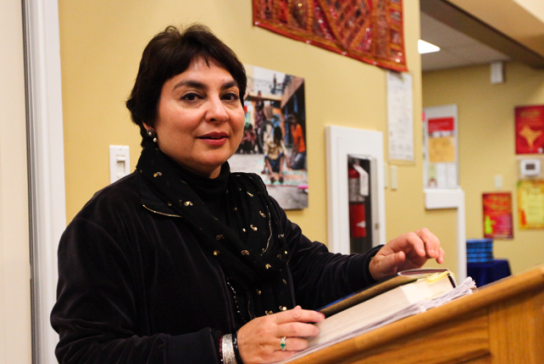Print Edition: October 17, 2012
So many people were eager to hear the humble words of a successful Canadian author that extra chairs had to be brought out. Excitement wafted through the air with the enticing aroma of Indian cuisine, provided to the attendees – the students, aspiring writers, professors and friends of the University, all gathered in the Centre for Indo-Canadian Studies.
On Wednesday, October 10, Shauna Singh Baldwin stood in front of over 60 guests and spoke about her latest book, Selector of Souls.
Centre for Indo-Canadian Studies (CICS) director, Satwinder Bains addressed the room. “There are two kinds of authors; those that make you think, and those that make you wonder. [Baldwin] does both.” Baldwin last attended UFV in 2006 and her visit this time “is like welcoming back an old friend,” Bains commented. The mic was then passed over to Anisha Gill, student and research assistant at the CICS. Gill, an aspiring writer herself, was given the honour of introducing Baldwin and her new novel.
Baldwin’s first novel, What the Body Remembers, won the Commonwealth prize for best book. Her second novel, The Tiger Claw, was a finalist for Canada’s Giller prize and has been optioned for a film. She was born in Canada and holds an MBA from Marquette University and an MFA from UBC. She didn’t discard her first degree for her second one either; she is the chief information officer of her own business. “I still have my day job,” she laughed. “Business has helped with my writing, it gave me economical motivation.”
Baldwin was inviting and inspirational to aspiring writers, she was very aware that it takes business and craft to be successful. “At the end of the day you are producing a product, you have to be a business person. It is a product danger if you choose one or the other.”
Baldwin read from Selector of Souls, and gave the audience an insight into the three main points of view at work in the novel. With the first came an intensely vivid description of handling an infant. The room was silent as Baldwin’s words resonated; there was an intense tonality with her storytelling. The second passage allowed for humour amidst the oppression that was being experienced. The third passage that Baldwin shared showed a new side of the gender separation argument. “Women’s stories are important, but I also think that it’s time we started talking about men’s stories – the brokenness of the men from trying to live up to this patriarchal society,” She said of giving men a voice in her novel. “Even women have forgotten the feminine, everyone has to be so macho.”
Event coordinator at the CICS, Sharanjit Shandra, opened the floor for discussion by touching on some of the major themes in the work. Baldwin responded to a question about the ending, without giving anything away. “It is a bit of a book club ending. No phone calls at 3 a.m. about the ending.” She had a way of warming up a room, and after some slight witticism, the searching questions began to flow.
Baldwin responded to a question about her choice in character names with precision, conveying a serious commitment and familiarity with her characters. With a novel set in India in the mid-1990s it was speculated that to the non-Indian reader, substance would be lost. “It tells a different story depending on the experience you, the reader, bring to the reading.”
Of the writing process, Baldwin didn’t sugarcoat the realities and difficulties of getting a book from conception to publication. “It takes a village to make a book. It’s this kind of process,” she said as she waved a finger wildly through the air. The novel, she said, was started in 2005, but took a pause when she published a collection of stories on the hyper-masculinity that came from the Bush administration. “I realised there were elements from those stories that belonged in the novel. There was a character from What the Body Remembers that wouldn’t go away.”
Nearly all the main characters in her novel, it seemed, were developed from secondary characters in her earlier works. “I trust the characters. I have to hold back my intent and let them tell the story.”
From UFV Baldwin was catching a 7 a.m. flight to continue her cross-country book tour. She will be attending writing fests and doing book signings, eventually ending her tour at the International Writers Fest in Toronto. That she fit UFV into her busy travel schedule is an honour. That the room was filled with eager-to-learn writers marks the worthiness of events like this one on campus.



